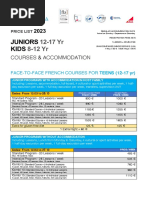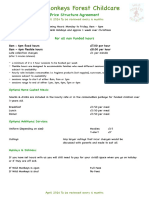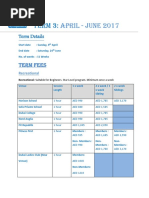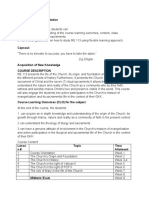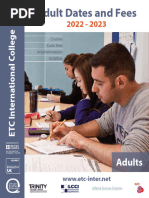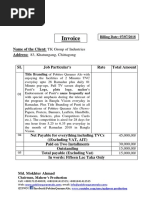SOM Prospectus 2020-2021
SOM Prospectus 2020-2021
Uploaded by
Mokhter AhmadCopyright:
Available Formats
SOM Prospectus 2020-2021
SOM Prospectus 2020-2021
Uploaded by
Mokhter AhmadCopyright
Available Formats
Share this document
Did you find this document useful?
Is this content inappropriate?
Copyright:
Available Formats
SOM Prospectus 2020-2021
SOM Prospectus 2020-2021
Uploaded by
Mokhter AhmadCopyright:
Available Formats
أعوذ ابهلل من الشيطان الرجيم بسم هللا الرمحن الرحيم
Prospectus, September 2020
School Profile:
Name: Safeer Online Madrasah (SOM)
(Owned by EduAid Limited, UK, Company No 09971816)
Mission: To create a generation who will always be guided by the Qur’an and Sunnah, and remain deeply
connected to Allah, His Messenger (Peace be upon him), the righteous caliphs, and authentic scholars in their
matters of life and death.
Vision: To provide high quality Islamic educational opportunities and experiences to young Muslim generations
around the globe.
Nature: This a part-time online madrasah, dedicated to Islamic education to our children and caters for ages 5 to
19.
Future Progression:
Our curriculum has a progressive pathway for anyone to looking to become a strong Hafidh, professional Imam,
and Islamic scholar (Mufti, Mufassir, Muhaddith etc) with mastery in Arabic language at European Jamia Islamia or
any other higher education institutes.
Our students can continue their undergraduate studies and further studies at European Jamia Islamia, London or
any other Islamic universities around the world, in particular in our partner universities in the UK and Muslim
worlds including Medina, Egypt and Malaysia.
There will be no formal classes for children aged 1-4 and 19+, but there will be customised learning modules and
resources for them, InshaAllah.
Parents can separately purchase all these courses and resources at any time they like.
Chairman: Dr Abul Kalam Azad, London
Vice Chairman: Dr Faruq Ahmad Madani, Austria
Principal: Prof. Shaikh Mahmud Bin Sayeed, London
Vice Principal: To be appointed
School contacts:
Website: www.safeer.org.uk
Email: info@safeer.org.uk
Safeer.madrasah@gmail.com
WhatsApp: +447507053169 +447861467847
Facebook: www.fb.com/safeeronlinemadrasah
Youtube: Safeeronlinemadrasah
SOM Prospectus 2020-2021 1
Admission form: https://forms.gle/C6McvyaeLWvnC2KS7
Academic year and terms:
Our Academic year follow UK & EU academic style: September to July.
There will be three terms as follows:
Autumn Term: 14th September to 24th December 2020
Holidays: 25th December-31st December 2020
Spring Term: 1st January 2021- 2nd April 2021.
Holidays: 5th April – 11 April 2021
Summer Term: 12th April 2021- 30th July 2021
Holidays: 31st July 2021-31st August 2021
Additionally, there will be Two Eid Holidays
Madrasah Student age groups:
Age 3-4 Pre-School Group: (register here, but no formal lessons)
Age 5-7 Infant Group:
Age 8-11 Primary Group:
Age 12-16 Secondary Group:
Age 17-19 Youth Group:
Age 19-24 University Group: (Apply to European Jamia Islamia Courses)
Age 24- Adult Group: (Apply to European Jamia Islamia Courses)
SOM Prospectus 2020-2021 2
Our Courses and fees for the academic Year 2020-2021
Course Packages Class Size Total weekly days Total weekly hours Subjects taught Total fees
1 Alimiyyah- Basic 15 2 days (Mon-Tue) or 2.5 hours a day X 2= 5 Qur’an & Tajweed, Qur’anic Arabic, £525 per year, plus
Package (Wed-Thursday) hours a week= Qur’an Studies, Sunnah Studies, yearly admin fees:
Imaan & Yaqeen, Ahkamul Islam,
230 hours a year £30
Usul & Fikr, Akhlaq, Tarikh, skills
(only £2.28 per hour)
2 Alimiyyah- Extended 15 4 days a week 2.5 hours a day X 4= Double lessons on £1000 per year, plus
Package Mon-Thursday 10 hours a week = Qur’an & Tajweed, Qur’anic Arabic, yearly admin fees:
(Highly recommended) 460 hours a year Qur’an Studies, Sunnah Studies, £30
Imaan & Yaqeen, Ahkamul Islam,
(after 5% discount)
Usul & Fikr, Akhlaq, Tarikh, skills,
Plus Hifzul Qur’an, (only £2.17 per hour)
presentation, clubs, and
Suhbah time with scholars
3 Hifzul Qur’an – Basic 10 5 days a week 2 hours a day X 5= 10 Qur’an, Tajweed, Basic duas £1200 per year, plus
Package Monday-Friday hours a week and Fiqh yearly admin fees:
460 hours a year £30
(only £2.60 per hour)
4 Hifzul Qur’an – 10 6 days a week Mon-Friday= 10 hours Qur’an, Tajweed, Basic duas £1650 per year, plus
Extended Package Monday-Friday Saturday= 4 hours and Fiqh yearly admin fees:
(Highly recommended) Total= 14 hours a Plus Qur’anic Arabic, Basic Qur’an £30
week and Sunnah Studies, presentation, (only £2.56 per hour)
= 644 hours a year clubs, and Suhbah time with
scholars
5 Arabic, English, and 15 2 days a week 1 hour a day x 2= 2 Qur’anic Arabic, or English, or £250 per year, plus
other World Monday and Wednesday, or hours a week Bengali, or Hawsa, or German, £30 admin fees
Tuesday and Thursday, or
languages = 92 hours a year or French, or Urdu (only £2.71 per hour)
Friday and Sunday
(Prices per
language)
6 Only Qur’an Reading 10 2 days a week 1 hour a day x 2= 2 Qur’an, Tajweed, Basic duas £375 per year, plus
& Tajweed Monday and Wednesday, or hours a week £30 admin fees
Tuesday and Thursday, or
= 92 hours a year (only £4.07 per hour)
Thursday and Friday, or Friday
and Sunday
7 Mujawwadul Qur’an 10 2 days a week 1 hour a day x 2= 2 Beautification of recitation £375 per year, plus
Monday and Wednesday, or hours a week (Qariyana) £30 admin fees
Tuesday and Thursday, or
= 92 hours a year (only £4.07 per hour)
Thursday and Friday, or Friday
and Sunday
8 Public Speech and 10 2 days a week 1 hour a day x 2= 2 Training on delivering public £375 per year, plus
Khutbah Monday and Wednesday, or hours a week speech, Khutbah, debate, TV £30 admin fees
Tuesday and Thursday, or
= 92 hours a year talk (only £4.07 per hour)
Thursday and Friday, or Friday
and Sunday
9 Writing skills 15 2 days a week 1 hour a day x 2= 2 Qur’anic Arabic, or English, or £250 per year, plus
(Arabic, English, Monday and Wednesday, or hours a week Bengali, or Hawsa, or German, £30 admin fees
Bengali, Hawsa, Tuesday and Thursday, or
= 92 hours a year or French, or Urdu (only £2.71 per hour)
French, German, Urdu) Thursday and Friday, or Friday
and Sunday
10 Nasheed Arts 10 2 days a week 1 hour a day x 2= 2 World class Nasheed singers £375 per year, plus
Monday and Wednesday, or hours a week will train young singers on £30 admin fees
‘Safeer Vocals’ Tuesday and Thursday, or
= 92 hours a year Nasheeds in Arabic, English, (only £4.07 per hour)
Thursday and Friday, or Friday
(Our own Nasheed and Sunday and other languages
group)
Fees can be paid:
1- Direct to Bank Accounts
2- By PayPal (Please add extra 4% charge for PayPal Payments)
3- BKash (in Bangladesh)
Bursaries and Scholarships:
We have limited scholarship funds for brilliant but extremely needy pupils/families. Please apply here for
scholarships and bursaries.
Donations and Sponsorships:
Safeer Online Madrasah is a charitable non-commercial institute. You can donate your Zakat and make Sadaqah
Jariah donations to sponsor a Hafidh or Alim/Alimah, or to develop our resources.
Please donate here
SOM Prospectus 2020-2021 3
Our classes for different time zones:
Time Zone A Time Zone B Time Zone C Time Zone D Time Zone E
Australia & New East Asia (Indonesia, South Asia and UK and Europe North America
Malaysia, Japan etc)
Zeeland Gulf countries (USA & Canada)
1 Pre-School Group Pre-School Group Pre-School Group Pre-School Group Pre-School Group
2 Infant Group Infant Group Infant Group Infant Group Infant Group
3 Primary Group Primary Group Primary Group Primary Group Primary Group
4 Secondary Secondary Secondary Group Secondary Secondary Group
Group Group Group
5 Youth Group Youth Group Youth Group Youth Group Youth Group
6 University University University Group University University Group
Group Group Group
7 Adult Group Adult Group Adult Group Adult Group Adult Group
Our Typical Class Time Table for Alimiyyah-(Basic) Course: (Examples are according to UK timing)
5.00-5.05pm 5.05- 5.30- 5.55- 6.05- 6.30- 6.55- 7.05-
5.30pm 5.55pm 6.05pm 6.30pm 6.55pm 7.05pm 7.30pm
Day One Registration Qur’an Qur’anic Break Imaan Akhlaqul Break Productive
& Dhikr Reading Arabic Muslim Muslims
Day Two Registration Qur’an Sunnah Break Ahkamul Tarikhul Break Principles
& Dhikr Studies Studies Islam Islam and thoughts
of Islam-
Our Typical Class Time Table for Alimiyyah-(Extended) Course: (Examples are according to UK timing)
5.00- 5.05- 5.30- 5.55- 6.05- 6.30- 6.55- 7.05-
5.05pm 5.30pm 5.55pm 6.05pm 6.30pm 6.55pm 7.05pm 7.30pm
Monday Registration Qur’an Qur’anic Break Imaan Akhlaqul Break Productive
& Dhikr Reading Arabic Muslim Muslims
Tuesday Registration Qur’an Sunnah Break Ahkamul Tarikhul Break Qur’anic
& Dhikr Studies Studies Islam Islam Arabic
Wednesday Registration Qur’an Qur’anic Break Imaan Akhlaqul Break Principles
& Dhikr Hifz Arabic Muslim and thoughts
of Islam-
Thursday Registration Qur’an Qur’an Break Ahkamul Weekly Assembly
& Dhikr Hifz Hifz Islam (Scholarly talks and pupil presentations)
Our Typical Class Time Table for Hifzul Qur’an Course: (Examples are according to UK timing)
5.00-5.05pm 5.05-5.30pm 5.30-5.55pm 5.55-6.05pm 6.05-6.30pm 6.30-7.00pm
Monday Registration & Dhikr Hifz Revision Tajweed Revision
Tuesday Registration & Dhikr Hifz Revision Hifz Revision
Wednesday Registration & Dhikr Hifz Duas Break Hifz Presentation
Thursday Registration & Dhikr Hifz Hifz Revision Imaan
Friday Registration & Dhikr Hifz Qur’anic Hifz Revision
Arabic
Saturday Registration & Dhikr Hifz Hifz Revision Fiqh
SOM Prospectus 2020-2021 4
Our Brief Syllabus - Alimiyyah (Long Term):
Our Syllabus has been derived from the following core principles:
• Our children need ‘Tarbiyyah’ – a comprehensive upbringing based on knowledge of the Qur’an, Sunnah, ‘Hikmah’ -
the reasonable application methods of the knowledge needed to make inner changes of the individuals so that
prophetic characters become their habits and part of their natural way of life, InshaAllah.
• We apply constructive methods of development in our children and youth.
• We celebrate every single example of progress and achievement of our children.
• Our Syllabus is solely based on Qur’an, Sunnah, and ways of our righteous predecessors.
• Our ultimate goal is to support our children to become pious productive Muslims who go on to contribute to society.
1 2 3 4 5 6 7 8 9 10
Levels Qur’an Qur’anic Qur’an Sunnah Studies Imaan & Ahkamul Principles and Akhlaqul Tarikhul Productive
Safeerus Yaqeen Islam thoughts of Muslim Islam
Reading Arabic Studies Islam-
Muslims
Sunnah Series Safeerul Safeerul Fiqh
Safeerul Usul
Imaan series Series Series
1 Elementary 100 Animal Stories about Articles of Basic rules of Frequently Love for Allah History of Creative
/Alphabets Qur’anic and bird Hadith Imaan 5 pillars of Asked (Duas) the creation works
words stories description Islam Questions
and by little
examples Muslims
2 Talqeen + 200 Stories of 40 Hadith Articles of Basic rules of Little Love for the Beginning Productive
Tahfeez Qur’anic Iblis and about Allah Imaan with 5 pillars of thinkers’ Prophet (SAW) and child at
Words Aadam Daleel Islam with thinking development home
Qur’anic ways of Islam
Daleel
3 Makharej 300 Stories of 40 Hadith Tawheed Basic rules of Golden rules Love for Islam Prophet Productive
Qur’anic other about Qur’an and its types 5 pillars of about Imaan and Muslims (SAW) Muslim in
Words prophets and Sunnah Islam with before the the school
Sunnah Daleel age of 40
4 Sifaat Safeerul Essentials 40 Hadith Allah’s Details about Golden rules Self-respect Prophet’s 13 Discover
Qur’an L1 of Qur’an about names and Taharah and about and respect for years life in your talents
Part 1 Studies Prophet power all kinds of Qur’an others Makkah
Salah
(SAW) and
Ahle Bayt
5 AHkaam al Safeerul Meaning 40 Hadith Kufr, Shirk, Basic rules of Golden Islamic Prophets Develop
Madd Qur’an L1 and about 4 its types and foods and principles Manners and wives, your talents
Part 2 stories of khalifah, Nifaaq drinks about values children and
Sunnah grand
Surah great children
103-114 sahabah
6 Meem- Safeerul Meaning 40 Hadith Different Basic rules of Golden Personal good Prophets life Expose your
Noon Qur’an L2 and about Kabah, Beliefs dress, Principles qualities and work in personal
Sakina Wa Part 1 stories of Al-Aqsa and within jewellery, about Fiqh Medina skills
Nabawi- Muslims arts, and
Tanween Surah 90- Madinah and culture
-102 other holy sites
7 Waqf- Safeerul Studies in 40 Hadith Different Basic rules of Golden Social and 4 righteous Social skills
Ibtida Qur’an L2 Surah about Parents, beliefs and family, principles environmental caliphs
Part 2 Yaseen, children, its impact in marriage, and about Ilm qualities
siblings and our lives relationships and
Rahman relatives education
and Mulk
8 Rawm wal Safeerul Concise 40 Hadith Major world Meaning and Golden Characters of a Brief Muslim Professional
Ishmaam Qur’an L3 Studies in about elders, religions history of principles global Muslim history skills
Part 1 Surah sick people, (descriptive) Fiqh, Imam about jobs (regional and
neighbours, and, and global) till
Baqarah Imams and Madhahib professions 2000
Ulama
9 Maraatib Safeerul Concise Famous Comparative Comparative Golden Dealing with Great Your skills
At-Tilawah Qur’an L3 Studies in Muhaddithun religions Fiqh Principles different Muslim in your own
Part 2 Surah and Hadith about problems scholars and projects
thoughts scientists
Aale books
Emran
10 Different Balaghatul Ijazul Sunnah as a Last Day and Basic rules of Great Extremism, History of Review your
Qiraat Qur’an Qur’an source of Ilm its signs Business, Muslim war and peace Muslims in skills and
and Shariah finance, and Thinkers the West projects
banking
Note:
Each of the above topics consist of 45 lessons including assessment and presentation. Our team will develop all the
lessons, activities, and exercises according to this outline, InshaAllah.
Pre-sessional Arabic Course:
Any students entering into our Alimiyyah course will have to study an intensive Arabic language course for at least one term in
order for them to communicate with the teachers and fellow students in Arabic and confidently read and understand books
written in Arabic.
SOM Prospectus 2020-2021 5
Admission Procedures and Policy:
1. Everyone must submit the SOM online admission application form
2. The office will send an acknowledgement email/message to the applicant with detailed instructions.
3. The SOM teachers will interview the applicant to assess their suitability for the chosen level and course.
4. Teachers may ask versatile questions to understand the applicant’s learning attitudes, abilities and family
backgrounds to determine the ways SOM may give utmost personal care to each pupil.
5. Teachers and admission team will decide whether a place can be offered to a particular child for a particular level or
course.
6. SOM, under no circumstances, is obliged to provide the parents with the reasons behind their decision.
7. If parents are not satisfied with the decision, they can make an appeal to the Principal or the Chairman of the
Governing Body via a prescribed form.
8. Once a place is offered to an applicant, a deadline will be given to parents to confirm the acceptance of the offer by
paying the advised fees and signing an acceptance contract.
9. Applicants will be admitted to a class or course for at least one year or other full duration of the course.
10. If for any reasons SOM needs to withdraw the course or class, refunds will be made for uncompleted duration, but an
admissions fee may be applied.
11. If an applicant needs to withdraw from a class or course, no refunds will be made unless there is a reasonable
replacement for the vacant seat.
12. Applicants must follow the deadlines for application, acceptance, and payments. Failure to do so may result in the
offer being retracted.
13. Each applicant will have to meet all academic and behavioural standards of SOM in order for them to transit to the
successive year and parents have to confirm their continuation in writing, and by paying the required tuition and
admission fees.
14. Siblings will have a preference in admission consideration subject to the positive track records of the existing sibling/s
at SOM. A sibling is defined as a brother or sister, half brother or sister, step-brother or sister or adopted brother or
sister whose main residence is at the same address. This criterion will apply to applicants with a sibling living at the
same address who is already on roll of the SOM.
Assignments and Homework Policy
It is a well-established fact that simply providing lessons for students is not enough. Students learn in a variety of ways and thus it is
crucial that a range of other activities are offered to aid learning. With this in mind, students will have the opportunity to complete
extra work in the form of assignments, group tasks, homework etc. All work will be marked, and students will receive feedback
signposting them towards how to improve further.
Behaviour Policy
The expectations at SOM are designed to focus on positive action rather than what a student should not do. The expectations
are agreed actions so that there is consistency and fairness in all areas of school life.
However, we recognise that all students may have specific needs. Therefore, within this consistent approach is an element of
flexibility to address the needs of specific children. SOM promises to:
1. Treat all students consistently and fairly.
2. Support will be made available to aid students’ learning and behavioural needs.
3. Students will be encouraged to make positive choices.
4. All students will be given the chance of a new start throughout the day and every day.
5. All successes will be celebrated.
6. High expectations will consistently be maintained, supported, and promoted.
7. Students will always be listened to.
Exclusion Policy:
Whilst it is never the intention to exclude students, we recognise that at times, it may be in the best interest of all parties
involved to remove the student from the course. This decision will not be taken lightly and will only be made after thorough
conversations with students and parents alike.
SOM Prospectus 2020-2021 6
Reasons for exclusion may include:
1. Serious breach of the school’s rules or policies
2. Serious risk of harm to the education or welfare of the students.
3. Any exclusion will be at the decision of the Head of School, usually in consultation with other members of the senior
leadership team and parent/guardians.
The decision to exclude
If the Head of School decides to exclude a student, he/she will:
• ensure that there is sufficient recorded evidence to support the decision
• contact the parents, explain the decision and ask that the student is collected
• send a letter to the parents confirming the reasons for the exclusion
• the length of the exclusion and any terms or conditions agreed for the pupil’s return
Attendance and punctuality policy
Safeer Online Madrasah is committed to providing an education of the highest quality for all its students and recognises this
can only be achieved by promoting excellent attendance. This is based on the belief that only by attending lessons regularly
and punctually will students be able to take full advantage of the opportunities available to them.
Attendance Policy for teachers:
Teachers will be in the classroom at least 15 minutes prior to the designated lesson time and must remain for another 5
minutes after the lesson finishes.
If any teachers are absent for a reason, SOM will arrange for a cover teacher and parents and students should be notified in
due time.
If a cover teacher cannot be arranged for any reason, a rescheduled class will be arranged, and students and parents will be
notified of the details of the rescheduled class.
Attendance Policy for students:
• All students are expected to attend all lessons.
• Students should aim to be present 5 minutes before the lesson begins.
• Any student who arrives to the lesson after 5 minutes will be marked as ‘late’.
• A persistent late attender will be dealt with after lesson detention or attending extended sessions. An extra
fee may be applied to cater for the exclusive lessons.
• Our attendance target is 100%. However, if the attendance falls below 95% in any two consecutive weeks,
students will have to go through our internal attendance improvements measures, which involves phone calls
to parents, one-to-one online meetings with parents and even penalties if it is proven to be deliberate
unauthorised absence.
• Excellent attendance will be rewarded by certificates, rewards, media coverage, and prizes.
Fees Policy:
1. All fees must be paid in advance.
2. Fees can be paid in two instalments should there be any genuine reasons.
3. No sibling discounts can be offered.
4. No refunds are available (If for any reasons SOM needs to withdraw the course or class, refunds will be made for
uncompleted duration, but an admissions fee may be applied. If an applicant needs to withdraw from a class or
course, no refunds will be made unless there is a reasonable replacement for the vacant seat)
5. Late payments will incur a 20% penalty charge
6. The fees for programmes are set out in the Prospectus, and SOM reserves the right to change this when required.
7. Payments can be made only when a place at SOM is offered to an applicant.
8. All fees, refunds, and credit notes are quoted and will be calculated in GB pounds sterling. Any international exchange
rate calculation or fluctuations will follow established procedures in the currency markets.
9. SOM reserves the right to different fee rates for different groups because of socio-economic situations and
backgrounds of the pupils.
SOM Prospectus 2020-2021 7
10. Some programmes of SOM might be extremely popular and have a limited number of places, which may require a
non-refundable deposit to be paid in order to secure a place when accepting an offer.
11. Any deposit made in advance will be taken as part of the overall course fee, and not as an additional amount.
12. Tuition fees are charged annually at the rate set for each programme for the appropriate mode of study.
13. SOM may allow a student to take a non-standard study load and, in this situation, there will be a different tuition fees
structure.
14. All non-standard tuition fees are subject to the decision of SOM.
15. Students who wish to change programmes or mode of study during the same academic year will have course fees
recalculated for the full year of study based on the mode transferred to.
16. Students who find themselves in a position where they are unable to pay tuition fees at any time should contact SOM
immediately for advice and support.
17. SOM may introduce ‘Financial Support Scheme’ (FSS) for genuinely needy families, subject to availability of the funds.
18. As a non-profitable institute, SOM can receive donations, Zakat and Sadaqah money from any individuals.
E-safety Policy:
General E-Safety Policy:
1. All our lessons will be delivered on online platform, preferably on Zoom Cloud.
2. However, with the permission of the SOM management, teachers may use other platforms such as Google Classroom
and Google Meet.
3. Students must keep their videos unmuted during the lesson time.
4. Teachers will have full control over muting and unmuting the audio or videos of the pupils.
5. Teachers will be recording all the lessons for office and marketing purposes.
6. All the recordings are copyrighted and belong to SOM and not for individual use.
7. Recordings of teaching sessions are provided for limited purposes only for the cohort of students for which the lesson
was delivered.
8. The recordings, including excerpts, are not intended for release to or use by the general public, and may not be
published, disseminated, or shared in any format or media.
9. Pupils can be permitted to use recordings only for their own private study and non-commercial research.
10. Students found in breach of the usage policy may be subject to disciplinary proceedings.
11. Recordings will be sorted on a secure cloud based folder accessed by the SOM or their own clients.
12. Recordings will normally be made available to students only during the academic year in which the recording takes
place; subject to Faculty Board approval, a longer access period may be agreed. Recordings will be retained for one
year beyond the agreed access period and will be stored and destroyed in line with SOM’s Statement of Records
Management Practice.
13. Recordings can be used by SOM for the use of continuing professional development or career progression
14. Students will not be permitted to access recordings after the agreed access period and an archive will not be provided.
E-Safety Policy for SOM teachers and staff:
1. Teachers should be in a neutral area where nothing personal or inappropriate can be seen or heard in the
background.
2. Teachers must be prepared for all the lessons and lesson contents must be checked before sharing with the students.
3. Lesson contents must be transferrable to their line managers for further improvements or dispute resolution.
4. Teachers must not instruct students to navigate other sites during the lesson unless supervised by another adult next
to him or her.
5. Whether hosting or joining a livestream, teachers must receive consent from parents, carers, and children for any
images of or identifying information about the child may be used.
6. The online stream should take place in school time and on school premises and must be supervised by appropriate
adults at all times.
7. Teachers must remain sensitive to the needs of individual students, including deaf and disabled individuals, and
individuals who may be sensitive to certain topics or issues that may arise during the livestream.
8. Appropriate staff should supervise and be on hand to handle any sudden changes or upsetting developments that
may occur during the livestream.
9. Any one-to-one sessions, for example pastoral care meetings, should be risk assessed and approved by the school’s
leadership team (DfE, 2020). Teachers should be aware of taking any safeguarding measures if they are having a one-
to-one conversation with a student.
SOM Prospectus 2020-2021 8
10. Teachers should use parent or carer email addresses or phone numbers to communicate with children, unless this
poses a safeguarding risk. Teachers should use school accounts to communicate via email or online platforms and not
their personal accounts.
11. Teachers should ensure any phone calls are made from an anonymous number so that personal contact details are
not visible.
12. Teachers should liaise with students regarding social distancing. Teachers should talk to students regularly about the
benefits and risks of the online world and give them space to ask questions and talk about anything that worries them.
13. Under no circumstances, should SOM teachers and staff use online platforms outside classrooms with their own
pupils or anyone else.
14. Teachers and staff should always use SOM official emails and other communication channels to communicate with the
parents and pupils.
E-Safety Policy for students
1. Students are not allowed to disclose private information to teachers, staff, or any other students or parents.
Safeguarding concerns should be raised within the appropriate channels.
2. Students are not allowed to respond to contact requests from people they are unfamiliar with.
3. During lessons, students are not allowed to use any other apps or sites asides what the teacher has requested.
4. Students should report to parents, guardians, and teachers should they see or hear anything upsetting or
inappropriate displayed during lessons.
5. Pupils are not allowed to create their own meeting rooms for SOM pupils outside the class time without the consent
of their parents
6. Pupils are not allowed to share their online IDs and passwords with any other pupils or adults.
E-Safety Policy for Parents/Guardians
Parents and Guardians are the ultimate responsible party for their children’s safety and wellbeing at home and during SOM
lesson time.
SOM Prospectus 2020-2021 9
You might also like
- Proposal - New Islamic School in TorontoDocument9 pagesProposal - New Islamic School in Torontoarifin2484100% (5)
- Read & Ascend 2016/2017 ProspectusDocument8 pagesRead & Ascend 2016/2017 ProspectusAbdul KarimNo ratings yet
- MIU Course Out Line-ArabicDocument4 pagesMIU Course Out Line-ArabicMokhter Ahmad67% (3)
- The Psychology of GenocideDocument269 pagesThe Psychology of GenocideMichael Pytlyk80% (5)
- Juniors 2023Document4 pagesJuniors 2023Gdoura YameneNo ratings yet
- QuranSky - School of Learning HOLY QURAN 2Document1 pageQuranSky - School of Learning HOLY QURAN 2shehnam javedNo ratings yet
- OkandilCourses-15112017Document2 pagesOkandilCourses-15112017Areej ArshadNo ratings yet
- Hifdh FormDocument4 pagesHifdh Formkewkew01.ndNo ratings yet
- Fee Structure From April 2024Document4 pagesFee Structure From April 2024api-617465357No ratings yet
- What Is Chayenu? - Click Here To Share!Document1 pageWhat Is Chayenu? - Click Here To Share!Yossi PelsNo ratings yet
- Plagiarism ReportDocument6 pagesPlagiarism ReportJaveria FathimaNo ratings yet
- PricelistDocument2 pagesPricelistIgnacio CobosNo ratings yet
- Term-Fees-Mar17 SyaquaticsDocument4 pagesTerm-Fees-Mar17 SyaquaticsVictor AshirwadamNo ratings yet
- 2020 Madrassah Nasihah CurriculumDocument3 pages2020 Madrassah Nasihah CurriculumSyed ShahNo ratings yet
- Lyon Bleu - Course Pricelist 2019Document2 pagesLyon Bleu - Course Pricelist 2019sumadi sumadiNo ratings yet
- Excel English Price List 2018Document8 pagesExcel English Price List 2018Camilo Juan Rovas VasrojasNo ratings yet
- Certification Chart-All LevelsDocument1 pageCertification Chart-All LevelsAlex HinrichsenNo ratings yet
- FIN-Course-Details-Pricing-GB-2024Document6 pagesFIN-Course-Details-Pricing-GB-2024Balakrishna RaoNo ratings yet
- Flyer Diploma in SyariahDocument1 pageFlyer Diploma in SyariahMstr SevenNo ratings yet
- 2016 Pricelist PDFDocument1 page2016 Pricelist PDFIsabel Moran ArecesNo ratings yet
- Education BrochureDocument1 pageEducation BrochureummimmyNo ratings yet
- Aardvark English Esl Prices and Fees 2023Document4 pagesAardvark English Esl Prices and Fees 2023api-135931048No ratings yet
- All Regular ELP Courses - 2022Document7 pagesAll Regular ELP Courses - 2022smmqutbNo ratings yet
- Online Quran Course Necessary Islamic Courses For Kids and AdultsDocument2 pagesOnline Quran Course Necessary Islamic Courses For Kids and AdultsHafiz HafizNo ratings yet
- Lesson 1: Course Orientation Learning OutcomesDocument4 pagesLesson 1: Course Orientation Learning OutcomesLykwhat UwantNo ratings yet
- Jerudong International School Brunei: Co-Educational - Day and Boarding - 1600 Pupils Aged 3 - 18Document9 pagesJerudong International School Brunei: Co-Educational - Day and Boarding - 1600 Pupils Aged 3 - 18JaimeNo ratings yet
- Childcare Charges 2007 2011Document2 pagesChildcare Charges 2007 2011West Dunbartonshire Labour GroupNo ratings yet
- Vocal Psychotherapy Training Course 2021-23Document7 pagesVocal Psychotherapy Training Course 2021-23Finlay McDermidNo ratings yet
- 2023 Course InfoDocument1 page2023 Course InfoMariana MartínezNo ratings yet
- UQA School Presentation-Ppt1Document19 pagesUQA School Presentation-Ppt1Mohamed Fahim Segu MohamedNo ratings yet
- EiT Courses and Prices 2025 (1)Document3 pagesEiT Courses and Prices 2025 (1)enrique gonzalezNo ratings yet
- English Path Price List 2024 v119Document26 pagesEnglish Path Price List 2024 v119sousagustavinho2008No ratings yet
- Kolel Spring / Summer 2011 ClassesDocument2 pagesKolel Spring / Summer 2011 ClassesProsserman JCCNo ratings yet
- Tafheemulquran - Pk-Online Quran Academy - Online Quran ClassesDocument6 pagesTafheemulquran - Pk-Online Quran Academy - Online Quran ClassestafheemulquranNo ratings yet
- PCM BrochureDocument4 pagesPCM BrochureDavi MeloNo ratings yet
- Emerald Price List 2024 AdultDocument10 pagesEmerald Price List 2024 AdultÁlvaro LassanceNo ratings yet
- Dates and Fees Adult 2022 - 2023 - FinalDocument12 pagesDates and Fees Adult 2022 - 2023 - FinalSINA ESKANDARINo ratings yet
- Institute of Quran and Sunnah - CoursesDocument13 pagesInstitute of Quran and Sunnah - Coursessalma23No ratings yet
- Spanish Courses: Dates & PricesDocument8 pagesSpanish Courses: Dates & PricesDmitriy DoroshenkoNo ratings yet
- Company Profile EduholytrenDocument18 pagesCompany Profile EduholytrenGen ZNo ratings yet
- Quotation September 2023-Visa DDocument4 pagesQuotation September 2023-Visa Dsarah GhNo ratings yet
- BTCA Chef Course Brochure 4 PDFDocument1 pageBTCA Chef Course Brochure 4 PDFJohnNo ratings yet
- PROYECTO ESPAÑOL Program 2023Document13 pagesPROYECTO ESPAÑOL Program 2023Anthony Mafuta MayilameneNo ratings yet
- UK Student Visa PresentationDocument44 pagesUK Student Visa PresentationNavjeet NayyarNo ratings yet
- RWA Parent Curriculum Guide - Grade 5 2019-20Document55 pagesRWA Parent Curriculum Guide - Grade 5 2019-20abihashakeel2006No ratings yet
- Negotiation procedureDocument3 pagesNegotiation procedureagoslf27No ratings yet
- 3 Year Da'Wah Programme 2011-12Document19 pages3 Year Da'Wah Programme 2011-12Asif IstiakNo ratings yet
- Tajweed Lessons Online For BeginnersDocument3 pagesTajweed Lessons Online For Beginnerssaira malikNo ratings yet
- Arden University ProspectusDocument90 pagesArden University ProspectusSwiss-Can Interlaken-VancouverNo ratings yet
- English Language Excellence ProgramDocument2 pagesEnglish Language Excellence ProgramYassamine ChammouNo ratings yet
- Course Longterm Academic Year and SemesterDocument3 pagesCourse Longterm Academic Year and Semesterسؤاد صت طةإزضNo ratings yet
- Rpe-Promes-Prota Kls 1Document22 pagesRpe-Promes-Prota Kls 1Deddy IrawanNo ratings yet
- Price List For Adults: England - Malta - South Africa - USADocument2 pagesPrice List For Adults: England - Malta - South Africa - USADenis AntônioNo ratings yet
- Vipassana Meditation EngDocument4 pagesVipassana Meditation EngTipitakaNo ratings yet
- Vipassana Meditation EngDocument4 pagesVipassana Meditation EngTipitakaNo ratings yet
- E Bournemouth Dil Okulu .Ralik PDFDocument1 pageE Bournemouth Dil Okulu .Ralik PDFGulhyder ZardariNo ratings yet
- February 2024 Fee Sheet Existing 3 4Document2 pagesFebruary 2024 Fee Sheet Existing 3 4alexpalmer89No ratings yet
- Junior School Fee StructureDocument1 pageJunior School Fee StructureDylan JustinNo ratings yet
- SpecialofferTaiwan 2011Document1 pageSpecialofferTaiwan 2011Lim NormanNo ratings yet
- 02 Days Orientation On PhonologyDocument2 pages02 Days Orientation On PhonologyPassang SherpaNo ratings yet
- M1 L1 Course Orientation 1Document2 pagesM1 L1 Course Orientation 1John Ivan Rotoni VicenteNo ratings yet
- The Reiki Manual: A Training Guide for Reiki Students, Practitioners, and MastersFrom EverandThe Reiki Manual: A Training Guide for Reiki Students, Practitioners, and MastersNo ratings yet
- BA & MA in IS Syllabus For IUSDocument37 pagesBA & MA in IS Syllabus For IUSMokhter AhmadNo ratings yet
- Chifzul Quran Depertment: Full Coures Nurani:Mornig 1Document1 pageChifzul Quran Depertment: Full Coures Nurani:Mornig 1Mokhter AhmadNo ratings yet
- Day 109 - النّحو Basic - Detailed Notes كان Part 1 - Chapter 10Document20 pagesDay 109 - النّحو Basic - Detailed Notes كان Part 1 - Chapter 10Mokhter AhmadNo ratings yet
- Essential Skills For 21st Century: Four-CsDocument27 pagesEssential Skills For 21st Century: Four-CsMokhter AhmadNo ratings yet
- Bill For TK GroupDocument1 pageBill For TK GroupMokhter AhmadNo ratings yet
- Plan For 2023 - Daffodil Islamic CenterDocument3 pagesPlan For 2023 - Daffodil Islamic CenterMokhter AhmadNo ratings yet
- 5 Year Plan Template 05Document17 pages5 Year Plan Template 05Mokhter AhmadNo ratings yet
- ICS - Islamic WorldView - Presentation 01Document28 pagesICS - Islamic WorldView - Presentation 01Mokhter AhmadNo ratings yet
- Prof Mokhter's QADocument1 pageProf Mokhter's QAMokhter AhmadNo ratings yet
- Charity Platform Trust Deed Legal FinalDocument18 pagesCharity Platform Trust Deed Legal FinalMokhter AhmadNo ratings yet
- Impression ManagementDocument19 pagesImpression ManagementMokhter AhmadNo ratings yet
- Zakat and Its Role in Poverty Eradication Bangladesh PerspectiveDocument20 pagesZakat and Its Role in Poverty Eradication Bangladesh PerspectiveMokhter Ahmad100% (1)
- Etiquette of Sleeping by Mokhtar AhmadDocument8 pagesEtiquette of Sleeping by Mokhtar AhmadMokhter Ahmad100% (1)
- IUT MarkSheetsDocument26 pagesIUT MarkSheetsMokhter AhmadNo ratings yet
- Parenting - Raising Righteous Children by Prof Mokhter AhmadDocument21 pagesParenting - Raising Righteous Children by Prof Mokhter AhmadMokhter AhmadNo ratings yet
- Enhancement of Quality EducationDocument3 pagesEnhancement of Quality EducationMokhter AhmadNo ratings yet
- Lecture# 01 Introduction To Muslim Contribution To Science and TechnologyDocument2 pagesLecture# 01 Introduction To Muslim Contribution To Science and TechnologyMokhter AhmadNo ratings yet
- Parenting by Professor Mokhter AhmadDocument3 pagesParenting by Professor Mokhter AhmadMokhter AhmadNo ratings yet
- IUT Course Out Line-ITS-4749Document3 pagesIUT Course Out Line-ITS-4749Mokhter AhmadNo ratings yet
- Seeking Spouse in IslamDocument6 pagesSeeking Spouse in IslamMokhter AhmadNo ratings yet
- Purification of Hearts: Md. Mokhter Ahmad Associate Professor IIUC-Dhaka Campus EmailDocument4 pagesPurification of Hearts: Md. Mokhter Ahmad Associate Professor IIUC-Dhaka Campus EmailMokhter AhmadNo ratings yet
- Etiquette of Home by Mokhtar AhmadDocument8 pagesEtiquette of Home by Mokhtar AhmadMokhter AhmadNo ratings yet
- Bathroom Etiquette in IslamDocument4 pagesBathroom Etiquette in IslamMokhter AhmadNo ratings yet
- Belief in The HereAfterDocument10 pagesBelief in The HereAfterMokhter AhmadNo ratings yet
- Julie Truex ResumeDocument2 pagesJulie Truex Resumeapi-557422843No ratings yet
- Lesson Plan For Grade 3 - Riggie May G. TudtudDocument4 pagesLesson Plan For Grade 3 - Riggie May G. TudtudJoy Manatad100% (3)
- Deep Video Inpainting Localization Using Spatial and Temporal Traces PDFDocument5 pagesDeep Video Inpainting Localization Using Spatial and Temporal Traces PDFtadeas kellyNo ratings yet
- Change of Candidature FormDocument2 pagesChange of Candidature FormZulkarnain ZainudinNo ratings yet
- BeepDocument23 pagesBeepMilena SáenzNo ratings yet
- Assignment: Assessment Item Brief Description Weighting Due Date Related Learning OutcomesDocument3 pagesAssignment: Assessment Item Brief Description Weighting Due Date Related Learning OutcomesRaghav ArroraNo ratings yet
- Thesis Template - 10 25 2021Document26 pagesThesis Template - 10 25 2021machiano984No ratings yet
- U.S. Court of Appeals For The Second Circuit Order To Show Cause in Giuffre v. MaxwellDocument2 pagesU.S. Court of Appeals For The Second Circuit Order To Show Cause in Giuffre v. MaxwelldarrenkaplanNo ratings yet
- Research Methodology Student Name Date Methodology of Qualitative ResearchDocument7 pagesResearch Methodology Student Name Date Methodology of Qualitative ResearchKarina Salazar NuñezNo ratings yet
- John: No. Very - People Care For What The Future Will Be LikeDocument8 pagesJohn: No. Very - People Care For What The Future Will Be LikeVolt AgencyNo ratings yet
- Interactive Math and Science Websites 1211176240676100 8Document27 pagesInteractive Math and Science Websites 1211176240676100 8CRPF School100% (4)
- Tseng 1998Document18 pagesTseng 1998Sara CarvalhoNo ratings yet
- Resume Deepak Maurya: Career ObjectiveDocument3 pagesResume Deepak Maurya: Career Objectiveranapratap singhNo ratings yet
- Starting and Running A Small Business British English TeacherDocument5 pagesStarting and Running A Small Business British English TeacherNatalia BarberanNo ratings yet
- T2000Document12 pagesT2000ThiagoPinheiroNo ratings yet
- Aberdeen University DissertationDocument8 pagesAberdeen University DissertationPayToWritePaperUK100% (2)
- Paper 1Document15 pagesPaper 1rjedm96No ratings yet
- Grade-4 Ln-10 Common NotesDocument3 pagesGrade-4 Ln-10 Common NotesGAJALAKSHMI LNo ratings yet
- 1985.the Search For Community From Utopia To A Co-Operative Society - NodrmDocument196 pages1985.the Search For Community From Utopia To A Co-Operative Society - NodrmGuzmán de CastroNo ratings yet
- EAPP 12-Q3-M7Document14 pagesEAPP 12-Q3-M7Ryza Mae AbabaoNo ratings yet
- Homeroom Guidance: Quarter 1 - Module 1: Self-Analysis: A Step To My ImprovementDocument10 pagesHomeroom Guidance: Quarter 1 - Module 1: Self-Analysis: A Step To My ImprovementANN LYNN RABULAN100% (8)
- Scholastic & Co Scholastic Log: Jan & Feb & March Log (2023-24) Grade: VDocument3 pagesScholastic & Co Scholastic Log: Jan & Feb & March Log (2023-24) Grade: Vmadhuboda2005No ratings yet
- Local LiteratureDocument1 pageLocal LiteratureMa.socorro SaballaNo ratings yet
- SL Loney CoordinateDocument452 pagesSL Loney CoordinateRaka100% (1)
- Marking Gcse CourseworkDocument7 pagesMarking Gcse Courseworkf67m6abx100% (2)
- Module3 - Learning, Uncertainity Lecture Notes. 16861418577274Document30 pagesModule3 - Learning, Uncertainity Lecture Notes. 16861418577274rashmidarling172No ratings yet
- Chapter - 003 Health Promotion in Older AdultsDocument10 pagesChapter - 003 Health Promotion in Older AdultsTrixie Alvarez100% (1)
- Group 6 - Interview Paper-1Document35 pagesGroup 6 - Interview Paper-1Nami ParkNo ratings yet
- 具有认知能力的协作机器人,适用于工业 4.0 及更高版本Document12 pages具有认知能力的协作机器人,适用于工业 4.0 及更高版本jevenheNo ratings yet




